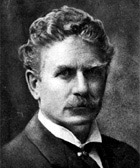|
| Navigation: Famous Quotes and Authors - Ambrose Bierce Quotes |
|
|
|
|
Ambrose Bierce Quotes and Quotations
 Piracy, n: commerce without its folly-swaddles - just as God made it. - Ambrose Bierce | Buying and Selling Quotes Abstainer: a weak man who yields to the temptation of denying himself a pleasure. - Ambrose Bierce | Character and Personality Quotes Christian: one who believes that the New Testament is a divinely inspired book admirably suited to the spiritual needs of his neighbour. - Ambrose Bierce | Christians and Christianity Quotes Cynicism is that blackguard defect of vision which compels us to see the world as it is, instead of as it should be. - Ambrose Bierce | Cynicism Quotes Mausoleum, n: the final and funniest folly of the rich. - Ambrose Bierce | Death and Dying Quotes Epitaph, n: an inscription on a tomb showing that virtues acquired by death have a retroactive effect. - Ambrose Bierce | Death and Dying Quotes Education, n: that which discloses to the wise and disguises from the foolish their lack of understanding. - Ambrose Bierce | Education Quotes That sovereign of insufferables. - Ambrose Bierce | Fame and Celebrities Quotes Destiny, n: a tyrant's authority for crime and a fool's excuse for failure. - Ambrose Bierce | Fate and Destiny Quotes History, n: an account mostly false, of events, mostly unimportant, which are brought about by rulers, mostly knaves, and soldiers, mostly fools. - Ambrose Bierce | History and Historians Quotes Acquaintance, n: a person whom we know well enough to borrow from, but not well enough to lend to. - Ambrose Bierce | Human Relations Quotes Ignoramus: a person unacquainted with certain kinds of knowledge familiar to yourself, and having certain other kinds that you know nothing about. - Ambrose Bierce | Ignorance Quotes Appeal in law: to put the dice into the box for another throw. - Ambrose Bierce | Law and Lawyers Quotes Litigant: a person about to give up his skin for the hope of retaining his bone. - Ambrose Bierce | Law and Lawyers Quotes Marriage, n: the state or condition of a community consisting of a master, a mistress, and two slaves, making, in all, two. - Ambrose Bierce | Marriage Quotes Philanthropist: a rich (and usually bald) old gentleman who has trained himself to grin while his conscience is picking his pocket. - Ambrose Bierce | Money Quotes To be positive: to be mistaken at the top of one's voice. - Ambrose Bierce | Opinion Quotes Painting, n: the art of protecting flat surfaces from the weather and exposing them to the critic. - Ambrose Bierce | Painters and Painting Quotes Peace: in international affairs, a period of cheating between two periods of fighting. - Ambrose Bierce | Peace Quotes Responsibility n: A detachable burden easily shifted to the shoulders of God, Fate, Fortune, Luck or one's neighbour. In the days of astrology it was customary to unload it upon a star. - Ambrose Bierce | Power Quotes Commendation, n: the tribute that we pay to achievements that resemble, but do not equal, our own. - Ambrose Bierce | Praise and Flattery Quotes Pray, v: to ask that the laws of the universe be annulled in behalf of a single petitioner confessedly unworthy. - Ambrose Bierce | Prayer Quotes Heathen, n. A beknighted creature who has the folly to worship something that he can see and feel. - Ambrose Bierce | Religion Quotes Infidel, n: in New York, one who does not believe in the Christian religion; in Constantinople, one who does. - Ambrose Bierce | Religion Quotes Apologize, v: to lay the foundation for a future offence. - Ambrose Bierce | Repentance and Apology Quotes Perseverance, n.: A lowly virtue whereby mediocrity achieves a glorious success. - Ambrose Bierce | Success Quotes Hope is desire and expectation rolled into one. - Ambrose Bierce | Hope Quotes Achievement: The death of an endeavor, and the birth of disgust. - Ambrose Bierce | Success Quotes Platonic Love is a fool's name for the affection between a disability and a frost. - Ambrose Bierce | Friends Quotes Admiration: Our polite recognition of another man's resemblance to ourselves. - Ambrose Bierce | Thank-yous and Closures Quotes Our polite recognition of another's resemblance to ourselves. - Ambrose Bierce | Admiration Quotes The echo of a platitude. - Ambrose Bierce | Applause Quotes Bore: a person who talks when you wish him to listen. - Ambrose Bierce | Bores Quotes A statesman who is enamored of existing evils, as distin-quished from the Liberal, who wishes to replace them with others. - Ambrose Bierce | Conservatism Quotes One who in a perilous emergency thinks with his legs. - Ambrose Bierce | Cowardice Quotes Philosophy: A route of many roads leading from nowhere to nothing. - Ambrose Bierce | Philosophy Quotes Women and foxes, being weak, are distinguished by superior tact. - Ambrose Bierce | Tact Quotes |
|
| The Quotes on this website are the property of their respective authors. All information has been reproduced on this website for informational and educational purposes only. Copyright © 2011 Famous Quotes and Authors.com. All Rights Reserved. |











